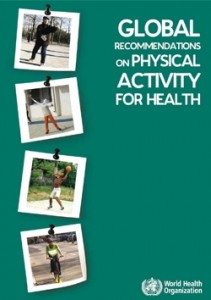Another Important Development in the Fight Against NCDs
 Earlier this month, on World Cancer Day (February 4th), the World Health Organization (WHO) issued physical activity guidelines on how regular exercise can contribute to the prevention of non-communicable diseases (NCDs). These Global Recommendations on Physical Activity For Health are an exciting development, providing clear, actionable information on the type and amount of physical activity considered most beneficial for the promotion of good health and the prevention of chronic disease. The WHO guidelines add to the world’s preparation for the UN Summit on NCDs to be held on September 19th and 20th, 2011, giving policy makers tools and data they may rely upon as they build national policies, and giving advocacy groups much-needed information that they can use to get more attention to NCD prevention.
Earlier this month, on World Cancer Day (February 4th), the World Health Organization (WHO) issued physical activity guidelines on how regular exercise can contribute to the prevention of non-communicable diseases (NCDs). These Global Recommendations on Physical Activity For Health are an exciting development, providing clear, actionable information on the type and amount of physical activity considered most beneficial for the promotion of good health and the prevention of chronic disease. The WHO guidelines add to the world’s preparation for the UN Summit on NCDs to be held on September 19th and 20th, 2011, giving policy makers tools and data they may rely upon as they build national policies, and giving advocacy groups much-needed information that they can use to get more attention to NCD prevention.
According to the report, “physical inactivity is associated with 3.2 million deaths per year, including 2.6 million in low and middle-income countries.”
The report states that, “at least 150 minutes of moderate intensity aerobic physical activity throughout the week for people aged 18 and over can reduce the risk of non-communicable diseases, including breast and colon cancers, diabetes and heart disease.”
At first glance, 150 minutes a week in bouts of at least ten minutes duration, may sound like a lot. But many of the activities that the authors use as examples are already integrated into even the busiest schedules. Walking or cycling, for example, when going to work, running errands, or in the context of regular family activities can really add up, and make a genuine contribution to a healthy lifestyle. Authors also cite household chores, gardening and sports or other planned exercise as sources of inspiration (and perspiration).
The report’s authors say that despite the growing incidence of chronic disease, and evidence that increased physical activity is key to prevention, there are few examples of national guidelines on physical activity for health in low- and middle-income countries. “Scientifically-informed recommendations, with a global scope, on the benefits, type, amount, frequency, intensity, duration and total amount of the physical activity necessary for health benefits are key information,” the authors say, and provide a good starting point for leaders to establish goals and objectives for a national policy.
Why did the WHO choose World Cancer Day for this announcement? Physical inactivity, the authors say, is estimated as being the principal cause for approximately 21–25% of breast and colon cancers.
